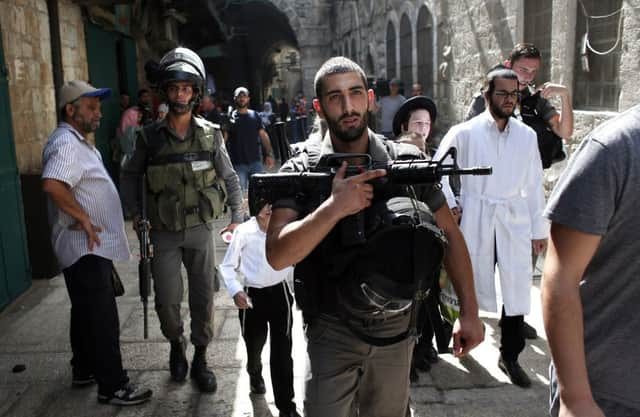Firebombs and fury at Jerusalem holy site


Police spokeswoman Luba Samri said officers entered the Al-Aqsa mosque compound early yesterday morning to disperse a group of protesters who had entered the mosque overnight.
The protesters threw rocks, fireworks, concrete blocks and a firebomb at officers, she said, adding that two Palestinians were arrested and five police officers were slightly injured.
Advertisement
Hide AdAdvertisement
Hide AdMs Samri said that a firebomb thrown at police from within the mosque ignited a rug and planks of wood stockpiled by the protesters. Mosque officials later extinguished the fire, she said. Police released photos showing piles of charred rubble outside the mosque.
Police later managed to restore calm and open the site for visitors, Ms Samri said, but a group of protesters remained inside the mosque.
Azzam Khatib, the director of the Waqf - the Islamic religious authority that oversees the compound - said Israeli police penetrated deep inside the mosque in what he called “a very dangerous development”.
Police denied the allegation and said officers only removed the barricade that protesters had set up at the entrance.
The director of the Al-Aqsa mosque, Omar Kiswani, blamed Israeli police for the tensions and said a gate used for visitors to access the site should be shut. He did not comment on the protesters’ alleged use of firebombs from within the sacred place, the third holiest site in Islam. Police have said that firecrackers and firebombs were thrown or fired from within the mosque.
The site is revered by Jews and Muslims and is a frequent flashpoint of violence. The compound in Jerusalem’s old city is known to Jews as the Temple Mount, site of the two biblical Jewish temples.
Muslims revere it as the Noble Sanctuary, where they believe the Prophet Muhammad ascended to heaven. It is ground zero in the territorial and religious conflict between Israel and its Arab neighbours.
Non-Muslim visitors are only allowed to enter the site at specific hours and are banned by police from praying there. Officers are stationed nearby to enforce that restriction as well as to ensure their safety.
Advertisement
Hide AdAdvertisement
Hide AdMuslims view these visits as a provocation and accuse extremists of plotting to take over the site. The compound often becomes the centre of tensions on major Jewish holidays such as Rosh Hashana, the Jewish new year, which was set to end last night.
The site is so holy for Jews that they traditionally have refrained from praying on the hilltop, congregating instead at the adjacent Western Wall.
Israel’s chief rabbis, as well as the rabbi of the Western Wall, have issued directives urging people not to ascend the Temple Mount, arguing that Jews could inadvertently enter the holiest area of the once-standing temple, where it was forbidden to tread.